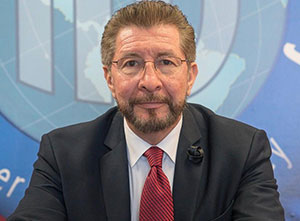Elections in Ecuador, between the return to the dictatorship and the need for good government

By: Carlos Sánchez Berzaín - 08/10/2023
Share:
Ecuador managed to separate from the government the 21st century socialism that with Rafael Correa had subjected it to more than ten years of dictatorship. Since President Lenin Moreno opted for democracy instead of the transnational dictatorial model, Correismo has maintained political strength and institutional control, while unleashing fear in the population with violence and crime. It is a long transition to democracy in which this October 15 the Ecuadorian people will vote between the return of the dictatorship and the need for good government.
The loss of the government due to Correism, which is Castro-Chavism in Ecuador, could only occur from within because in the dictatorial Ecuador of Rafael Correa the elements of indefinite permanence in power were fulfilled with laws tailored to the regime, a divided opposition, a functional opposition, political prisoners and exiles, state terrorism, lack of freedom of the press, judicial persecution, corruption with impunity, narco-state, anti-imperialist discourse and submission to the dictatorships of Cuba and Venezuela.
By separating his government from the dictatorial system of 21st century socialism, Lenin Moreno began a process of transition to democracy that is not completed and has suffered very serious setbacks in the government of Guillermo Lasso. The effective transition to democracy is only achieved with two minimum conditions: avoiding impunity and ending the legal order of the dictatorship by restoring the laws of the Republic. Moreno did the first but did not have time to end the dictatorial legal system that even touches the Constitution.
President Lasso failed to fulfill his obligations by not carrying out the sentence for corruption of 8 years in prison against Rafael Correa, becoming complicit in his impunity; was negligent in controlling the validity of the rule of law by not promoting the change of the infamous laws of the dictatorship that maintain citizen insecurity and its influence on institutions as important as the intelligence services, justice, security systems, the electoral system and more.
Lasso did not understand that after winning elections in democracy, “governance” is needed, which is “government capacity.” It is “institutional and political stability, and effectiveness in decision-making and administration…”.
When you reach the presidency as the second minority, in the second round, in a presidential system, in a process of transition to democracy that must dismantle a transnational criminal organization that held the government and that still controls an important part of the power, it is urgent and essential to structure a solid and strong government of national unity, which is only possible with a consensus government plan that grants it the necessary support in the National Assembly. Lasso did not do it and I hope Daniel Noboa understands it if he wins the second round.
The minority governments that are producing the presidential systems of Latin America are governments doomed to failure because the presidents ignore governability. This evil is not a matter of color or pseudo-ideological positioning, since reality shows that just as badly as Lasso, considered a right-wing president, is doing for Petro in Colombia, for Boric in Chile, and for Castillo in Peru it was worse, the three socialists of the 21st century or left.
The Ecuadorian people are being victims of terrorism due to Castro-Chavist conspiracy and action and due to bad government and institutional inaction. The presidential candidate Fernando Villavicencio has been murdered, on the same day one of the hitmen died and then in the prisons of Ecuador 7 more hitmen who were imprisoned for the assassination were killed, without any news of the masterminds although everything points to socialism. of the 21st century. The Mayor of Manta Agustín Intriago has been murdered; Villavicencio's family and supporters are under threat...
Ágora Democrástica has presented a study that shows that electoral fraud in Ecuador is possible because Correa “appropriated” the National Electoral Council. Correa directs Luisa González's campaign and travels around the world in absolute impunity. People are afraid of the return of Correismo but they are also afraid of how things are and that atmosphere of insecurity is what Correismo wants.
The axis of confrontation in the second electoral round in Ecuador is the return to dictatorship versus the need for good government. Luisa González is the socialism of the 21st century that guarantees impunity and the return of Rafael Correa, and Daniel Noboa is the alternative that has the challenge of building governability to conclude the recovery of freedom and democracy with good government.
*Lawyer and Political Scientist. Director of the Interamerican Institute for Democracy
«The opinions published herein are the sole responsibility of its author».